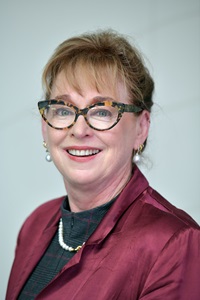2025 | Volume 26 | Issue 5

Associate Professor Kerin Fielding will be the first woman surgeon to hold the post of Chair of the Council of Presidents of Medical Colleges (CPMC)—the peak body representing Australia’s specialist medical colleges.
Based in Wagga Wagga, New South Wales, she is a long-standing advocate for rural and regional health equity and currently serves as Clinical Lead for Specialty Surgery at the University of Notre Dame Australia (Wagga Wagga campus) and Chair of the Rural Health Equity Strategy Steering Committee at RACS. As president of RACS from 2022 to 2023, she steered the College through a challenging financial crisis, helping restore stability and confidence across the organisation. She reflects on her leadership journey, her priorities for CPMC, and her vision for advancing specialist care nationwide.
Shaping a national vision
Associate Professor Fielding steps into her new role with a clear mission. She wants to strengthen CPMC’s collaboration with government and the Health Workforce Taskforce (jurisdictions and health minister) while increasing advocacy for member colleges and our peak bodies responsible for quality and standards.
Her second priority is improving healthcare access and equity—focusing on rural training, selection, and specialist opportunities in rural, regional, and remote areas.
To turn these goals into tangible outcomes, she says, “The most important priority is to build trust. That means being honest and transparent about what the colleges can do, what they cannot do, how we can work together, and where support is needed.”
Associate Professor Fielding hopes to build on the trust established by the current chair, Professor Sanjay Jeganathan, and continue a collaborative approach.
Modernising governance
As Chair-elect, Associate Professor Fielding helped shape new governance reforms for CPMC, leading to a revised board structure that leverages the experience of past presidents. She compared the necessary update to similar reforms at RACS.
"Approved in July, this new structure will make a big difference," she says.
The reforms also bring several projects back in-house that were previously managed externally. The updated framework provides stronger financial oversight and better value from CPMC’s investments. “With these changes and the addition of new staff, the organisation is now financially stable, with robust books and a stable foundation.”
Driving equity and workforce collaboration
For Associate Professor Fielding, addressing the shortage of specialists in rural and remote areas requires a shift from isolated efforts to deep-seated collaboration. This strategy tackles a dual challenge—smaller hospitals cannot sustain all specialties, and retaining talent in remote areas is difficult.
Her approach is two-fold. First, she champions direct support for practitioners, noting “retention requires more than training: ongoing peer support, CPD, and career development are essential.”
Initiatives like the Rural Health Equity Group's video coaching for surgeons—to be published in the ANZ Journal of Surgery—put this into practice, sharing ideas to combat professional isolation.
Second, she is building a unified national framework. “We don’t want every college running its own workforce office in isolation,” she says. As CPMC chair, she leverages the Council as a platform for colleges to share resources and research.
Programs like RACS' FATES (Flexible Approaches to Training in Expanded Settings) projects exemplify this, connecting experts across regions to strengthen training. Building on this model, Associate Professor Fielding sees CPMC as a national platform to coordinate efforts and improve specialist services across the country.
“Medicine is a team sport,” she says, emphasising the need for a coordinated effort to place primary care physicians, surgeons, anaesthetists, and physicians where they are most needed. She also sees potential for this approach to bridge the Tasman, helping to address similar workforce challenges in Aotearoa New Zealand.
While recognising the role of international medical graduates, she warns expedited pathways are not a permanent fix. “The ultimate goal is to build sustainable training pipelines at home, which we can only achieve by working together.”
Building consensus across diverse specialties relies on negotiation and diplomacy. “Where views diverge, negotiation is vital,” she says. “My time as RACS president gave me extensive practice in finding common ground.” She is now applying this skill to promote the collaboration necessary to ensure equitable access to health care for all communities.
Leading with diversity
Appreciating different perspectives also highlights the strength of diversity in leadership. Drawing on her experience as a rural woman orthopaedic surgeon, Associate Professor Fielding brings a distinctive perspective that informs her approach.
“Diversity helps us serve all communities effectively,” she says, noting CPMC’s strong gender and cultural representation and the presence of accomplished women presidents.
Throughout her career, she has broken new ground—becoming the first woman orthopaedic surgeon in New South Wales and only the third woman to serve as RACS president. Her appointment as CPMC chair marks another step forward for women in senior medical leadership.
Leaving a lasting mark
Associate Professor Fielding’s goal is clear: to build strong rural and regional training pathways across as many specialties as possible within two years. “If we can achieve this, it will be an amazing legacy for CPMC and the communities we serve.”
For her, lasting impact comes from teamwork and delivering healthcare where it’s needed most. From breaking ground as the first woman orthopaedic surgeon in New South Wales to guiding RACS through a financial crisis, she has combined vision with resilience.
As CPMC chair, Associate Professor Fielding is set to shape national health policy while championing diversity, equity, and collaboration.